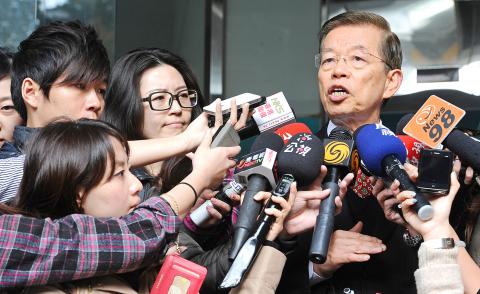The Democratic Progressive Party (DPP) yesterday responded to criticism from party members and across the Taiwan Strait about its “lame” China policy review, insisting that the review was a responsible move and an ongoing effort, and that the party’s core values and position could stand the test of time.
The provisional review, which was announced on Thursday, made no significant recommendations. It said that the spirit of the party’s 1999 resolution on the nation’s future remained unchanged, but that it would be flexible in the way it engages with China.
China’s Taiwan Affairs Office (TAO) told a news conference in Beijing yesterday that the DPP “still stubbornly insisted on its Taiwan independence ideology based on ‘one country on each side’ ... and incited hostility and confrontation with its so-called core values.”

Photo: Liu Hsin-de, Taipei Times
TAO Director Zhang Zhijun (張志軍) was also quoted as saying that the DPP would “have a hard time finding an opening [of the bilateral engagement] if it could not keep up with the times and public opinion and if it failed to be open-minded.”
Beijing’s response “was not helpful to the DPP’s effort in improving bilateral relations,” DPP spokesperson Xavier Chang (張惇涵) said yesterday, adding that the DPP’s basic position toward China has been accepted by the majority of Taiwanese and could stand the test of time.
“We stand firm on the values that should be upheld, but will be more flexible in our policies,” he said.
The most notable development on Thursday was the replacement of the “constitutionalism consensus” — the provisional conclusion that previously served as the DPP’s foundation for cross-strait engagements — with “actively seeking public consensus in Taiwan,” which was proposed by former DPP chairperson Tsai Ing-wen (蔡英文).
Tsai said on Facebook yesterday that her initiative of the “Taiwan consensus,” which proposed to seek maximum consensus in Taiwan before dealing with China, would help the DPP formulate a set of distinctive China policies that could better those of the Chinese Nationalist Party (KMT) and safeguard the nation’s sovereignty.
“The initiative of ‘Taiwan is the Republic of China (ROC) and the ROC is Taiwan’ that I proposed during the presidential campaign in 2012 has been, by far, accepted by the majority of Taiwanese. With that as the foundation, we could eventually find the maximum consensus, which is what I called the Taiwan consensus,” Tsai wrote.
Former premier Frank Hsieh (謝長廷) yesterday expressed disappointment that his proposal of “Two sides, two constitutions (憲法各表)” was not adopted and included in the review, saying that the DPP “still tried to bypass the issue of the ROC and its Constitution” in its discussions.
Hsieh’s proposal was based on the idea that the ROC and the People’s Republic of China’s constitutions are both legitimate and the two sides share a special relationship, but govern separately.
The former premier said the DPP’s China policy remained ambiguous and unclear and “perhaps that was why support for the DPP’s China policy still lagged behind support for the KMT’s — 27 percent to 35 percent — despite the KMT’s sorry performance.”
Several academics and DPP members described the review as a failure, with former DPP lawmaker Julian Kuo (郭正亮) saying that the removal of the constitutionalism consensus marked a setback for Su, while National Chengchi University professor Tung Cheng-yuan (童振源) was pessimistic about Beijing’s willingness to engage the DPP in the future after the party’s failure to adjust its political position.

Taiwan is stepping up plans to create self-sufficient supply chains for combat drones and increase foreign orders from the US to counter China’s numerical superiority, a defense official said on Saturday. Commenting on condition of anonymity, the official said the nation’s armed forces are in agreement with US Admiral Samuel Paparo’s assessment that Taiwan’s military must be prepared to turn the nation’s waters into a “hellscape” for the Chinese People’s Liberation Army (PLA). Paparo, the commander of the US Indo-Pacific Command, reiterated the concept during a Congressional hearing in Washington on Wednesday. He first coined the term in a security conference last

A magnitude 4.3 earthquake struck eastern Taiwan's Hualien County at 8:31am today, according to the Central Weather Administration (CWA). The epicenter of the temblor was located in Hualien County, about 70.3 kilometers south southwest of Hualien County Hall, at a depth of 23.2km, according to the administration. There were no immediate reports of damage resulting from the quake. The earthquake's intensity, which gauges the actual effect of a temblor, was highest in Taitung County, where it measured 3 on Taiwan's 7-tier intensity scale. The quake also measured an intensity of 2 in Hualien and Nantou counties, the CWA said.

The Overseas Community Affairs Council (OCAC) yesterday announced a fundraising campaign to support survivors of the magnitude 7.7 earthquake that struck Myanmar on March 28, with two prayer events scheduled in Taipei and Taichung later this week. “While initial rescue operations have concluded [in Myanmar], many survivors are now facing increasingly difficult living conditions,” OCAC Minister Hsu Chia-ching (徐佳青) told a news conference in Taipei. The fundraising campaign, which runs through May 31, is focused on supporting the reconstruction of damaged overseas compatriot schools, assisting students from Myanmar in Taiwan, and providing essential items, such as drinking water, food and medical supplies,

New Party Deputy Secretary-General You Chih-pin (游智彬) this morning went to the National Immigration Agency (NIA) to “turn himself in” after being notified that he had failed to provide proof of having renounced his Chinese household registration. He was one of more than 10,000 naturalized Taiwanese citizens from China who were informed by the NIA that their Taiwanese citizenship might be revoked if they fail to provide the proof in three months, people familiar with the matter said. You said he has proof that he had renounced his Chinese household registration and demanded the NIA provide proof that he still had Chinese